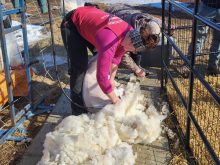Horses destined for slaughter are not likely to be rerouted to Canada now that a federal appeals court ruling in the United States has effectively halted the practice of turning horses into human food.
Les Burwash of Alberta Agriculture’s horse industry branch said legislation before the U.S. Senate and House of Representatives that mirrors the court ruling will likely be modeled after a California law that prohibits the transportation of horses to slaughter. If the federal law passed it would also prevent U.S. horses coming to Canada for slaughter.
Read Also

Charges laid after cattle theft
Saskatchewan RCMP lay two charges against a man after six cattle went missing.
A court injunction on March 28 blocked the U.S. Department of Agriculture from providing horse meat inspections for a fee at three slaughter plants.
Congress stopped funding horse meat inspections in 2005, but USDA devised a way to provide them for a fee. Judge Colleen Kollar-Kotelly found the department did not follow federal procedures for setting up the program.
Burwash said his contacts in the U.S. horse industry expect the ruling to be appealed.
He said cull horses need to be dealt with and if they are not killed, there could be welfare issues when animals do not receive proper care or are turned loose to fend for themselves in the wild. Disposal of horse carcasses varies by state.
“What now are the options for people with the unwanted horse?” Burwash said.
People who oppose using horses for food have raised the issue in Canada, but Burwash said it is a matter of choice among consumers.
Three plants processed horses for human consumption in the U.S., but without federal inspection they cannot continue. Canada has two horse slaughter plants, which ship meat to the European Union and Asia. Live horses from North America are also shipped to Japan, where they are fattened and slaughtered.
The Alberta Equestrian Federation has developed a position that supports horse slaughter, with similar acceptance coming from British Columbia and Saskatchewan.
“We are hoping more people hear about this statement on slaughter. It states this is reality and it is OK if it is done in a humane manner,” said Pat Barriage of the equine federation.
The federation advocates humane treatment of all horses. It supports processing as a humane alternative to allowing horses to continue lives of inadequate care or abandonment.

















